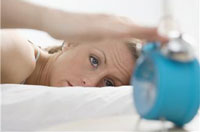
“A 2009 poll by the National Sleep Foundation found that only 28 percent of those surveyed regularly got eight hours or more of sleep a night. The average was around six and a half hours on weekdays and seven on weekends. Those who slept less than eight hours a night typically had mood problems, including worry and anxiety, ate more sugar and unhealthy food and drank more caffeinated beverages!”
~ Trudy Scott, The Antianxiety Food Solution
It’s amazing how many people don’t get enough sleep and there is so much we can do from a nutritional point of view to change this. Here are six things to consider:
- One of the first things I think about when a client can’t sleep is low serotonin. Low serotonin symptoms include insomnia, depression, negativity, worry and anxiety, irritability, PMS and afternoon and evening cravings. And low serotonin can be boosted with tryptophan, taken as a supplement and/or in food sources.
- Research has actually shown that a medical or functional food made with pumpkin seeds improved sleep, due to the good sources of tryptophan and zinc. In another study this same functional food was also shown to reduce anxiety and social phobia.Pumpkin seeds can be soaked in water overnight and then lightly roasted with olive oil, sea salt, pepper, turmeric and ginger. Food-wise, pumpkin seeds are a favorite of mine for a healthy snack and my clients love them. Here is an blog post that discusses the benefits of soaked nuts and a roasted pumpkin seed recipe
- When tryptophan is taken as a supplement, some is converted to serotonin and some to melatonin. Melatonin is fabulous for resetting your circadian rhythm so your sleep cycle gets back to normal. If taking tryptophan doesn’t quite get you sleeping through the night then taking additional melatonin may help. Sublingual melatonin helps you fall asleep and the timed-release form helps you stay asleep.
- Other factors that should be considered when sleep is an issue: low blood sugar, addressing low serotonin levels, addressing low GABA levels, checking for parasites and dysbiosis, and making sure you don’t have high cortisol.
- Other nutrients that may be helpful: vitamin B6 (which helps improve mood and reduce anxiety too), zinc (which is also important for skin health, reducing anxiety, improving mood, helping with blood sugar balance and PMS), and magnesium (which is also calming).
- Of course, it also helps to use a comfortable soft eye patch to keep the room dark and to use earplugs to keep things quiet. Also, keep clock radios and cell phones away from your head and don’t use an electric blanket! Having a warm bath with essential oil of lavender is also a great help to help you wind down at the end of a hectic day.
Try some of the above tips and get those eight hours of sleep and you’ll have less mood problems, experience less worry and anxiety, eat less (or no) sugar and unhealthy food and drink less (or no) caffeinated beverages! Sweet dreams!

